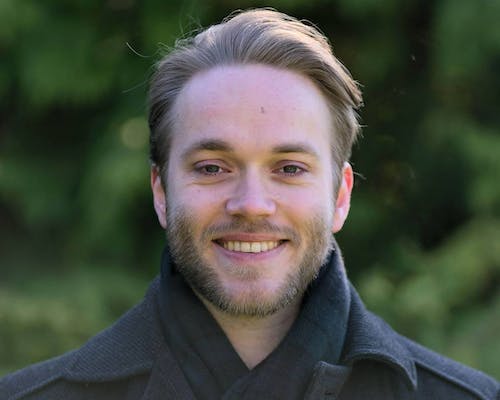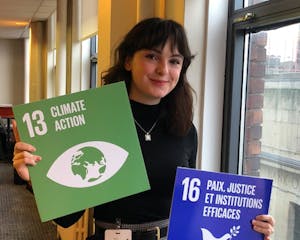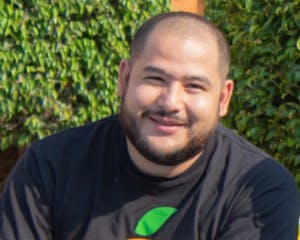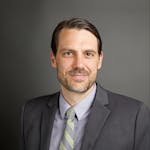There is hope in the climate change fight. It lies in young leaders like those you’ll read about below, stepping up and advancing climate action without waiting for permission or recognition. These are just a few stories from the UN Foundation’s Young Climate Advocates network, made up of over 800 young people in over 100 countries.
Scientists say it’s likely the planet will reach 1.5°C of global warming above preindustrial levels in the next decade, that we are already at 1.2°C, and that we are headed toward more intense storms, wildfires, and droughts. This somber reality has many young people feeling anxious about their future lives on Earth — whether they’ll be able to have families of their own, find jobs, and access the resources they need to survive. But many young people are not waiting to be saved. They recognize that bold action is needed now so they’re stepping up, educating themselves and each other, building coalitions, and using their voices and actions to pressure world leaders to swiftly address climate change and rising global temperatures.
The message of these young leaders is simple: Make climate action your own. Take the first step. We don’t need permission to make a difference.
1. Paola Flores Carvajal, Bolivia
“Real change is happening because young people are doing things, not just waiting,” says Paola Flores Carvajal, describing the power of youth in driving climate action.

Paola’s passion for the environment and awareness of climate change go back to her childhood growing up in a rural community. There, she saw firsthand how climate change has a disproportionate impact on rural and Indigenous communities, with pollution devastating the rivers she once knew as pristine. This moved Paola to start Magnífica Warmi, a project that conducts environmental impact workshops for rural women in areas vulnerable to pollution and poor waste management. Paola’s goal is to empower these women to take the lead in teaching their families and neighbors and to spread Magnífica Warmi’s lessons on environmental stewardship.
“We as young people can be the heroes to change the future of our planet,” says Paola. But her message extends beyond youth as she looks to major climate moments later this year like COP26 and COP15. “Now more than ever we need to get connected to work together no matter where we are from or what language we speak. The planet needs all of us to take action now and become climate advocates.”
2. Simon Engelke, Germany
Early on in his studies, Simon Engelke knew that climate change and energy storage would shape the trajectory of the world for years to come. Fast forward a few years, he earned a Ph.D. in lithium-ion batteries and founded Battery Associates to drive innovation in the battery sector. Battery Associates hosts workshops for emerging engineers and develops open-source hardware and software for the battery sector to foster collaboration and replicable, scalable solutions. “Our mission is to bring people together across countries and sectors to decarbonize grids, transportation, and more,” he says.

Simon says transformative change is possible, that “there’s a lot of positive momentum from companies, governments, and individuals realizing that energy storage and batteries are a very important piece of the climate puzzle.”
He also has a message for young people hoping to influence major climate moments this year: “Passion is one of the strongest assets. Any government, any company, is made up of people. You have to understand what motivates them and at the end of the day it’s about inspiring one another, motivating one another.”
3. Kasha Slavner, Canada
For filmmaker, storyteller, and social justice activist Kasha Slavner, peace and climate justice are intimately intertwined. “Working in silos isn’t going to help anyone achieve much,” she says.

Through her two films, 1.5 Degrees of Peace and The Sunrise Storyteller, Kasha highlights the connection between climate change and conflict, and how peace-building can help the world face climate challenges sustainably as a unified front. Her impact strategy includes going into schools and using these films as education tools alongside peace-building and climate literacy workshops “to turn inspiration into meaningful action.”
“It all comes down to knowledge and education,” she said. “You can’t really change what you don’t know, and a lot of people are unaware of the detrimental impacts of the worsening climate situation or militarism [for example].”
4. Luis Angeles, Mexico
When Luis Angeles, renewable energy engineer and Chief Financial Officer at Solar4Eat, learned how much food was going to waste in his home country, he felt sick.

“If you summed up all the food that goes to waste in Mexico, you could feed around 37% of the population that suffers from food insecurity in Mexico,” he said. “That’s impressive and really sad.”
The goal of Solar4Eat, a startup focused on direct solar thermal energy applications for the food industry, is to address the food waste problem in Mexico through sustainable business. The company develops quality, locally sourced, dehydrated foods from otherwise wasted produce. Luis is passionate about creating a circular economy in Latin America by tackling issues related to the food supply industry, including water, soil, and forced labor.
5. Pooja Tilvawala, United States
“It’s not that youth can’t do it,” says Pooja Tilvawala. “It’s that people are often blind to the fact that age is not a determinant of genius or ability.”

After attending a climate action conference in college, Pooja was in awe at the conversations taking place, and how the environment and climate change intersect with just about everything. She was inspired by the collective agency of the youth climate movement, but immediately identified barriers to young people getting involved and staying involved in the climate action space. Her list of barriers continued to grow, including everything from geography to financing, so she asked the broad questions: “How can we get more youth involved in climate and able to stay involved? How can we foster global collaboration?”
This research recently blossomed into the Youth Climate Collaborative, an organization that Pooja started to help young people access databases on climate projects around them, resources on financing, and opportunities to scale up their work.
If you would like to connect with any of the young climate advocates above, please reach out to ddomeyer@unfoundation.org. Now is the time to strengthen networks and scale solutions.



 View All Blog Posts
View All Blog Posts

